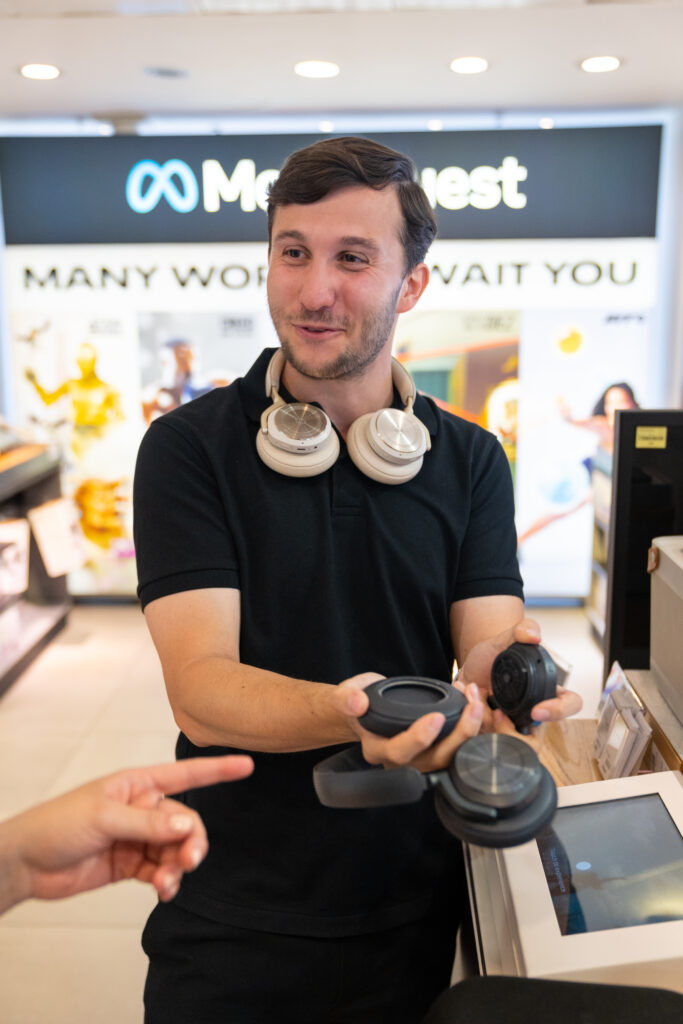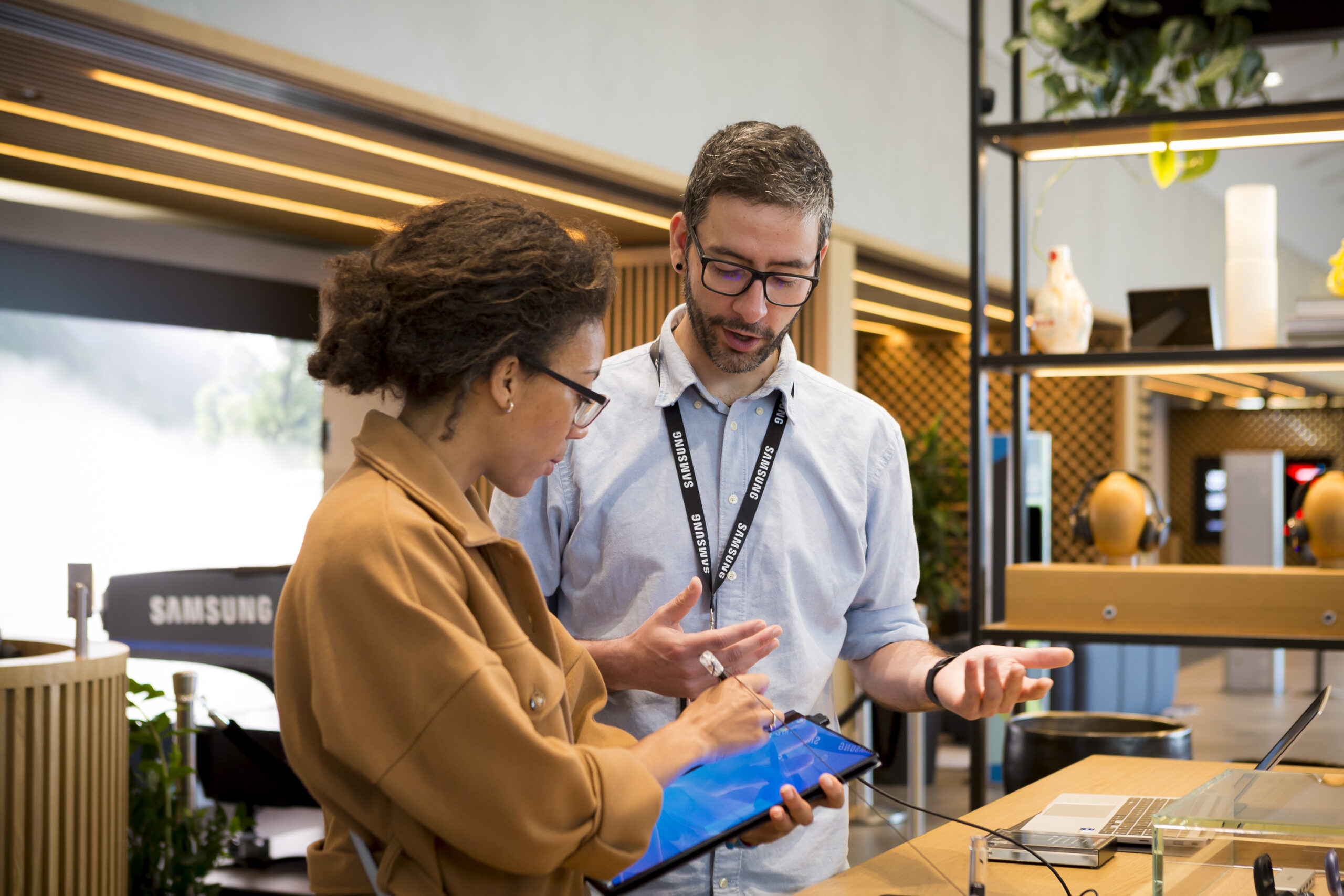Consumers crave more than just products; they seek experiences that resonate, connect them with brands on a deeper level, and leave a lasting impression.
This is where experiential retail takes centre stage. But what does experiential retail mean, how does customer service play into it, and what can you do to make it work for your brand?
This article delves into the power of experiential retail, exploring how it harnesses the magic of customer service to drive engagement, loyalty, and ultimately, sales. We’ll dissect the key differences between traditional and experiential retail, analyse the components of delivering exceptional customer service, and reveal how technology and highly trained product experts work in tandem to create unforgettable experiences.
What is Experiential Retail?
Experiential retail is the art of transforming shopping into a memorable journey. It goes beyond the mere transaction, focusing on creating immersive and engaging experiences that connect with customers on a deeper level.
Expert brand advocates are crucial to bringing experiential retail to life. Highly trained staff, passionate about the brand, can transform product knowledge into engaging storytelling. These individuals become guides, curating personalised experiences and building lasting customer relationships. Their ability to connect with customers on an emotional level is paramount to fostering brand loyalty and advocacy.
Technology also plays a critical part in experiential retail. Things such as interactive displays, live video shopping, and even virtual reality product showcases can transport customers into the heart of the brand story. By leveraging data and analytics, retailers can gain valuable insights into customer behaviour, enabling them to refine their offerings and create even more engaging experiences.
Ultimately, experiential retail is about creating a sense of wonder, discovery, and connection. By combining omnichannel strategies, expert brand advocates, and innovative technology, retailers can transform their stores (both online and physical) into hotly desired destinations.
The Fuel of Experiential Retail: Customer Service
Effective customer service is the lifeblood of experiential retail. In a traditional retail setting, customer service might be limited to answering basic product questions or facilitating transactions. However, in experiential retail, it takes centre stage.
Highly trained product experts combine their in-depth product knowledge with strategic storytelling to connect emotionally with customers. They guide customers through the experience, answer in-depth questions, personalise interactions, and ultimately help customers discover the perfect product for their needs.


Experiential vs Traditional Retail: A Tale of Two Worlds
So, how does experiential retail differ from its traditional counterpart? Here’s a breakdown:
- Focus: traditional retail prioritises product display and transactions. Experiential retail focuses on customer engagement and creating memories.
- Environment: traditional stores tend to be static and product-centric. Experiential stores are immersive, designed to evoke emotions and encourage interaction.
- Staff: traditional retail relies on basic product knowledge for sales staff. Experiential retail requires product experts who can deliver engaging and personalised experiences.
- Customer journey: traditional retail focuses on a linear path from product discovery to purchase. Experiential retail creates a circular journey that extends beyond the transaction, encouraging repeat visits and brand advocacy.
- Technology integration: traditional retail might use technology for basic functions like point-of-sale (POS) systems. Experiential retail leverages technology for immersive experiences, personalisation, and data collection.
The Benefits of Experiential Retail: A Winning Formula
By prioritising customer experience, experiential retail unlocks a number of benefits for retailers. Here are some ways it fuels success:
- Increased customer engagement: experiential retail transforms shopping into an interactive activity, fostering deeper brand connection and positive associations.
- Enhanced brand loyalty: memorable experiences create loyalty, encouraging repeat visits and customer advocacy.
- Boosted sales: experiential retail can lead to increased average order value and higher conversion rates as customers feel more confident in their purchases.
- Data collection: interactive elements can gather valuable customer data, enabling retailers to tailor their offerings and marketing efforts.
- Competitive advantage: by offering unique and memorable experiences, retailers can differentiate themselves in a crowded marketplace.
- Improved brand perception: experiential retail can enhance brand image and reputation, positioning the brand as innovative and customer-centric.
Creating Winning Customer Service in Experiential Retail
Delivering exceptional customer service in this dynamic landscape requires a strategic blend of technology and human expertise:
The technology:
From interactive displays to personalised product recommendations at point-of-sale, you can enhance every stage of your customers’ experiential journeys. Technology also enables you to connect the dots of a customer’s online and in-store journey.
The people:
Through a team of highly-trained product experts, you can create personalised interactions with your customers, provide them with in-depth product knowledge that helps them make informed purchases, and weave a compelling brand story to which they can feel connected.
With consistent training, you can empower teams to be brand advocates and connect with customers on a deeper level. Staff can answer questions with authority, and guide shoppers towards their perfect purchase. This human touch is an essential ingredient in crafting memorable customer experiences.
Innovating For The Future of Experiential Retail
While experiential retail is no longer a brand-new concept, it’s by no means going out of style. That’s because customers will always demand more from their shopping experiences. According to Shopify, 85% of European consumers would be more loyal to brands that offer things like high-quality products or promotions and surprises but also bring a human touch to their shopping experiences.
By providing emotional connections, personalised interactions, and engaging experiences, retailers can differentiate themselves, build brand loyalty, and drive long-term success.
The key to succeeding in experiential retail is customer service innovation — finding new ways to delight and engage with your audience must become a priority. The good news is that, with technology ever-evolving, there will always be something new to explore, so long as you keep your mind open to the opportunities.
Ready to transform your retail space into a vibrant hub of customer experiences?
At Stellar, we help brands leverage the power of experiential retail with expert staff training and strategic omnichannel solutions.
Contact us today to discuss how we can help you create unforgettable customer experiences and ignite your retail success.

